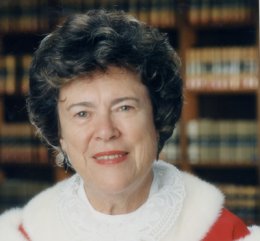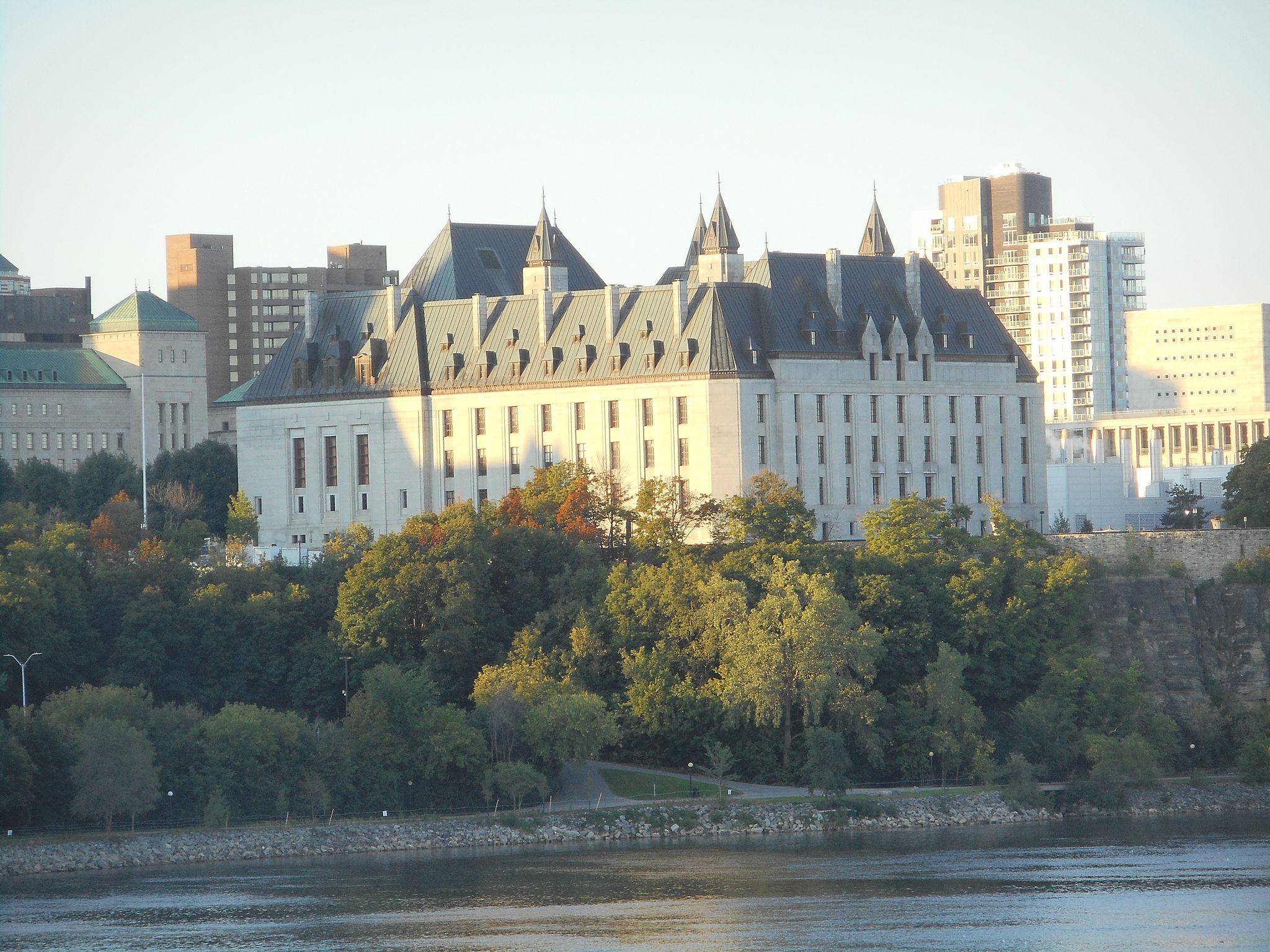Claire L'Heureux-Dubé (née L'Heureux), CC, GOQ, KC, Supreme Court of Canada judge 1987–2002, Quebec Court of Appeal judge 1979–87, Superior Court of Québec judge 1973–79, lawyer (born 7 September 1927 in Quebec City, QC). Claire L'Heureux-Dubé was the first woman to serve on the Quebec Court of Appeal. She then became only the second woman, and first woman from Quebec, to serve on the Supreme Court of Canada. L'Heureux-Dubé’s work on the court played a key role in helping to develop Canada’s legal conception of equality. Her decisions led the Court to adopt a less technical and more socially contextualized approach. She has also written many articles in legal journals, served on numerous boards, and addressed audiences in Canada and around the world. The recipient of more than a dozen honorary degrees, she is a Companion of the Order of Canada and a Grande officière of the Ordre national du Québec.

Early Life and Family
Claire L'Heureux was born in Quebec City. She was the oldest of four girls and grew up in Rimouski, on the south shore of the St. Lawrence River. Her father, Paul, was a customs agent and military officer and a strict disciplinarian who discouraged her interest in a law career. Her mother, Marguerite, on the other hand, supported her ambitions.
L'Heureux graduated from the Ursuline convent school in Rimouski in 1943, having won the Lt. Governor’s medal and nearly every academic award. She graduated from Collège Notre-Dame-de-Bellevue in 1946. L'Heureux then became only the ninth woman to earn a law degree from Université Laval.
In 1952, L'Heureux became the only woman practising law in Quebec City when she accepted a position with the firm of Bard, L'Heureux & Philippon. With the addition of new partners, the firm later became L'Heureux, Philippon, Garneau, Tourigny, St-Arnaud & Associés.
When she was 31 years old, L'Heureux married Arthur Dubé, an engineering professor. They had a son, Pierre, and a daughter, Louise. Arthur Dubé died of suicide in 1978 and Pierre died in 1994. Louise went on to become a lawyer.
Public Service
From the late 1960s to the mid-1970s, Claire L'Heureux-Dubé served on the Quebec Advisory Council on the Administration of Justice and with Quebec’s Civil Code Revision Office. (See Civil Code; Civil Law.) She was vice-president of the Consumers Council of Canada and of the Vanier Institute of the Family. She also chaired the Committee on the Law on Persons and on the Family and was president of the Family Court Committee. (See Family Law.)
Superior Court of Québec and Court of Appeal
Quebec’s Superior Court hears criminal and civil cases not assigned to other courts, as well as all criminal trials involving a jury. In 1973, L'Heureux-Dubé became the third woman appointed by the federal government to serve as a judge on the Superior Court of Québec.
While serving on the bench, L'Heureux-Dubé was commissioner of the 1976 Royal Commission of Inquiry that looked into suspected irregularities and corruption involving the federal Department of Manpower and Immigration.
In 1979, L'Heureux-Dubé became the first woman appointed to the Quebec Court of Appeal. The reasons for her decisions in cases brought from lower courts enhanced her reputation for meticulous research and clarity with language.
Supreme Court of Canada
In 1987, Prime Minister Brian Mulroney appointed Claire L'Heureux-Dubé to the Supreme Court of Canada. She was only the second woman to serve on the country’s highest court and the first woman from Quebec. L'Heureux-Dubé’s work on the court played a key role in helping to develop Canada’s legal conception of equality. The Canadian Charter of Rights and Freedoms had become part of Canada’s Constitution only five years prior to her appointment. Her decisions led to the adoption of a less technical and more socially contextualized approach.

One of her more significant contributions to the evolution of equality in Canadian law came with the R v. Ewanchuk case. A 17-year-old girl was sexually assaulted by a 44-year-old man. But an Alberta lower court and then its Court of Appeal acquitted him after considering how the girl was dressed, her past and lifestyle, and whether she should have more forcefully defended herself. In a February 1999 decision, the Supreme Court overturned the Alberta ruling. L'Heureux-Dubé wrote a separate argument that concurred with the decision but argued that judges should not base judgments on myths, stereotypes and biases. She stated that sexual assaults are an “offence against human dignity and a violation of human rights.” The ruling, and specifically L'Heureux-Dubé’s argument, helped change the law concerning consent in Canada. It was encapsuled in the phrase “No means no.”
After the Supreme Court
Following her retirement from the Supreme Court in 2002, L'Heureux-Dubé continued to publish in legal journals and speak at conferences throughout Canada and internationally. She advocated for greater recognition of social equality, women’s rights and minority rights. She served on numerous boards, including as president of the Maison de justice de Québec and Quebec City’s Office of the Ombudsman. L'Heureux-Dubé also became Université Laval’s judge in residence.
Awards
- Queen’s Counsel (now King’s Counsel) (1969)
- Gloire de l'Escolle medal, Université Laval (1986)
- Medal of the International Year of the Family – Quebec (1994)
- Barreau de Montréal (1994)
- Medal of the Barreau du Québec (1995)
- Canadian Award, Canadian Hadassah-WIZO (1996)
- Justice Medal, Canadian Institute for the Administration of Justice (1997)
- Margaret Brent Women Lawyers of Achievement Award, Commission on Women in the Profession, American Bar Association (1998)
- Yves Pélicier Award, International Academy of Law and Mental Health (2002)
- Touchstone Award, Canadian Bar Association (2003)
- Companion, Order of Canada (2003)
- Grande officière, Ordre national du Québec (2004)
Honorary Degrees
- Doctor of Laws, Dalhousie University (1981)
- Doctor of Laws, Université de Montréal (1983)
- Doctor of Laws, Université Laval (1984)
- Doctor of the University, University of Ottawa (1988)
- Doctor Honoris Causa, Université du Québec à Rimouski (1989)
- Doctor of Laws, University of Toronto (1994)
- Doctor of Laws, Queen's University (1995)
- Doctor of Laws, Gonzaga University (1996)
- Doctor of Civil Laws, University of Windsor (2000)
- Doctor of Laws, York University (2001)
- Doctor of Laws, Concordia University (2001)
- Doctor of Laws, Law Society of Upper Canada (2002)
- Doctor of Laws, University of Victoria (2004)

 Share on Facebook
Share on Facebook Share on X
Share on X Share by Email
Share by Email Share on Google Classroom
Share on Google Classroom







